2025 Best Online PhD in Communications Programs

If you’re interested in the relay of information, including through digital media and mass communication, then pursuing a PhD in Communications online program may be the right path for you.

Earning your doctoral degree in communications can provide you with the opportunity to work in a variety of fields.
Editorial Listing ShortCode:
Communications experts play an important role in managing the communication of information from one person, group, or organization to another.

Universities Offering Online PhD in Communications Degree Programs
Methodology: The following school list is in alphabetical order. To be included, a college or university must be regionally accredited and offer degree programs online or in a hybrid format.
American University
American University offers an online Doctor of Philosophy in Communications program. The program is designed to be completed in 3 years by providing courses for 11 months a year. A total of 54 credits are needed to graduate. Applicants must submit 2 letters of recommendation, a resume, GRE scores, and a master’s thesis.
American University is accredited by the Middle States Association of Colleges and Secondary Schools.
Clemson University
Clemson University offers a PhD program in Rhetorics, Communication, and Information Design.
Students need to complete 30 credits hours and 6 credit hours of research to defend a dissertation. Exams and the defense of the dissertation must be completed on campus. Applicants must have a GPA of 3.5 or higher and a portfolio of past graduate work.
Clemson University is accredited by the Southern Association of Colleges and Schools Commission on Colleges.
Colorado State University
Colorado State University offers a PhD in Communications. Students may choose courses in the following fields: Rhetoric and Civic Engagement, Relational and Organizational Communication, or Film and Media Studies. Applicants must complete 81 credits to graduate. Applicants need 3 letters of reference and a resume to apply.
Colorado State is accredited by The Higher Learning Commission, a Commission of the North Central Association of Schools and Colleges.
Indiana University of Pennsylvania
Indiana University of Pennsylvania offers a PhD in Media and Communication Studies. A total of 60 credits are needed to graduate, with 12 hours used for a dissertation. Students must maintain a GPA of 3.0 or higher to graduate. Applicants must submit official transcripts and 2 letters of recommendation when applying.
The Indiana University of Pennsylvania is accredited by the Middle States Commission on Higher Education.
Liberty University
Liberty University offers an online PhD in Communications program. Students must complete 60 credit hours and may apply to transfer in up to half of the credits required. Courses are 8 weeks long. Applicants must have a GPA of 3.0 and need to submit official transcripts to be eligible for the program.
Liberty University is accredited by the Southern Association of Colleges and Schools Commission on Colleges.
Regent University
Regent University offers a PhD in Communications. The program can be completed online, though a week-long residency in Virginia Beach during the summer is required. Students must complete a minimum of 56 credit hours to graduate.
Applicants must submit official transcripts and a past graduate program academic paper and need to complete an academic background questionnaire. Regent University is accredited by the Southern Association of Colleges and Schools Commission on Colleges.
Robert Morris University
Robert Morris University offers an online PhD in Information Systems and Communications program. Students must complete 60 credit hours, with 12 dedicated to writing a dissertation. At the end of each school year, students must finish a milestone.
Applicants must have a GPA of 3.0 and submit 3 letters of recommendation. An interview with the program director and admissions committee is also required.
Robert Morris University is accredited by the Middle States Commission on Higher Education.
Texas Tech University
Texas Tech University offers a Doctor of Philosophy in Technical Communication and Rhetoric. Applicants must submit 3 letters of recommendation, a writing sample, and transcripts from previous college work.
Students must complete at least 72 hours to graduate from the program. They also have the option to add one of five areas of emphasis to their degree, including Technical Communication and Rhetoric of Science and Healthcare. Texas Tech University is accredited by the Southern Association of Colleges and Schools Commission on Colleges.
University of Alabama
The University of Alabama offers a Doctorate in Communications and Information Sciences. Students may choose to add a concentration in one of seven different areas, including Media Processes and Effects and Books and Publishing Studies.
To be eligible for the program, applicants must have a GPA of 3.0 or higher and submit 3 academic references and their transcripts.
The University of Alabama is accredited by the Southern Association of Colleges and Schools Commission on Colleges.
University of North Dakota
The University of North Dakota offers a PhD in Communication. The program can typically be completed in 5 years and requires 90 credit hours.
To be eligible for the program, applicants must either have a master’s degree in communications or a GPA of 3.0 or higher from their undergraduate studies. GRE scores and 3 letters of recommendation must be submitted when applying.
The University of North Dakota is accredited by the Higher Learning Commission of the North Central Association of Colleges and Schools.
Online PhD in Communications Programs
Online PhD in Communications programs can help you develop your expertise in areas of public relations, mass communication, digital and social media, and journalism.
Common careers in this field include:
- Teacher or professor
- Chief communications officer
- Director of public relations
- Public relations manager
- News media correspondent
- Technical writer
Becoming a teacher within a postsecondary school is a common career path for graduates of a communications PhD program. As a postsecondary teacher, you may develop course curriculum, instruct students on various communication topics, and evaluate student performance through assessments, tests, and other measures.
There are a number of other career options outside of academia that you may also qualify for. Some graduates advance their careers as public relations specialists or managers.
Working in the area of public relations may require drafting press releases and communicating with the media on a regular basis. PR professionals help businesses manage public relations crises and maintain their reputation or public image.
Specific course curriculum can vary depending on the school and program that you choose to attend. Here are some topics, though, that are commonly covered in a communications program:
- History of communication
- Communication theories
- Digital media and mass communication
- Communication in politics
- Media and the environment
- Research methods
- Professional writing
In most cases, PhD communication programs require you to complete coursework as well as a research project in the form of a dissertation.
Communications Careers & Salaries
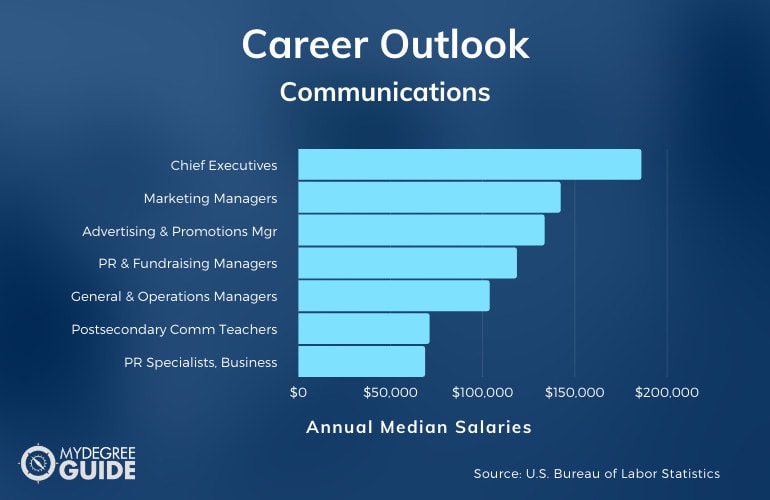
Earning an online PhD in Communications can help you qualify for a variety of advanced positions. Leadership and management positions can include chief communications officer or director of public relations.
PhD graduates tend to teach at postsecondary schools, pursue academic research, or embark on rewarding careers in finance, law, policy development, nonprofit organizations, or government agencies.
According to the Bureau of Labor Statistics , positions in the field of communications are far-reaching and can span across various areas and industries. One of these professional areas includes media, such as journalism, news correspondence, or broadcasting.
The Bureau of Labor Statistics projects that a number of positions in the communication field will experience positive job growth in the next ten years. These positions include top executives (4% job growth), marketing managers (7%), public relations specialists (7%), and postsecondary teachers (9%).
Communications Doctorate Curriculum
Courses in doctoral communications programs can provide you with advanced knowledge in areas related to public relations, digital media, mass communication, media studies, and research. Courses may include:
- Communication Research Methodologies : This course is an in-depth look at standard methodologies used in research in the field of communications and the arts and social sciences more generally.
- Quantitative Research in Communication : You’ll review quantitative research practices in social science, including the use of statistics.
- Qualitative Research in Communication : This course is an overview of qualitative research methods in communication, including interviewing techniques, observation, and the use of focus groups.
- Advanced Communication Theory : You’ll take a look at key theories in the field of communication, including scholars, existing research, and emerging trends and theories.
- History of Communication : This course is an analysis of communication throughout history, including a look at recent changes in technology and the impact that those changes have had on communication.
- Writing for Publication : You’ll examine the approaches used in writing for publication, including conference papers, chapter books, academic papers, and more.
- Social, Mobile, and Online Media Analytics : You’ll look at various social, mobile, and media tools available, along with the metrics, analytics, and big data related to each that help explain the experience of end-users.
- Social Media Strategy : This course is an overview of various digital channels that exist in the realm of communications studies and media, and you’ll learn about leveraging those channels to persuade and interact with an audience.
- Content Communication : This course is a review of content communication strategies used in the pursuit of delivering a message to a target audience and capturing the intended result.
- Analytics in Digital and Strategic Communication : You’ll look at how research in communication has evolved over time, including the increased use of digital analytics.
In addition to regular coursework, you may be required to complete a dissertation, thesis, or research project option as part of your degree program.
Admissions Requirements
In order to enroll in one of the available communication doctoral programs, you may be required to meet a number of admissions requirements. Criteria can vary from one school to the next, but here are a few common requirements:
- Bachelor’s degree . It’s necessary to hold a bachelor’s degree from an accredited school and to submit your official transcripts.
- GRE or GMAT scores . Although this requirement is becoming less common, some schools still require the submission GRE or GMAT scores.
- Letters of reference . Delivery of one or more letters of reference from academic or professional supervisors and colleagues is often requested.
- Resume . You may need to submit a copy of your resume, detailing your academic and workplace experience.
Additional admissions criteria can include completing a written essay, submitting an online application, and completing a writing test.
Accreditation
Regional accreditation is a status that verifies that a postsecondary school and its programming meet a specific set of academic quality standards.
Attending a regionally accredited school can impact your ability to transfer credits to another program or join various professional associations. The accreditation status of the school you choose to attend can also influence the hiring decisions of potential employers.
You can visit the US Department of Education ’s website to find out the accreditation status of a particular school or program.
Financial Aid and Scholarships
There are a number of financial aid and scholarship opportunities that may help you fund your doctorate in communication. Financial aid is available to qualifying students in the form of grants and loans from federal and state governments.
Another option is employer training programs. If you’re currently employed, you can check to see if you’re eligible to receive educational funding from your employer through professional development or employee training programs.
In many cases, postsecondary schools also offer funding to PhD students. While funding amounts and options can vary from one school to the next, some examples include tuition rebates or cost of living stipends. For more information regarding financial aid, you can visit the US Department of Education ’s website.
Communications Professional Organizations
Joining a professional association or organization for communications professionals can provide you with the opportunity to network with others in your field. Professional organizations may also highlight new employment opportunities.
Some communications professional organizations include:
- American Advertising Federation (AAF)
- International Association of Business Communicators (IABC)
- Public Relations Society of America (PRSA)
Professional organizations can also be a great resource for learning and networking if you’re interested in starting your own business.
Is Communications a Good Career?
A career in communications may allow you to explore positions in education, finance, law, policy development, nonprofit, or government.
While it is common for graduates of a PhD in Communications program to pursue positions in teaching, a number of other career options are available. These include positions in public relations, management, research, and media.
The Bureau of Labor Statistics forecasts that a number of positions in the field of communications will experience growth over the next several years. These positions include top executives (4% job growth), marketing managers (7%), public relations specialists (7%), and postsecondary teachers (9%).
What Can You Do with a PhD in Communications?
According to the Bureau of Labor Statistics, earning your PhD in Communications online may allow you the opportunity to work in a variety of positions. Public relations, media, and education are just some of the industries where your communications skills are applicable.
Common careers in this field include chief communications officer, marketing manager, advertising and promotions manager, public relations manager, postsecondary school teacher, and public relations specialist. Other career options include writer, author, reporter, correspondent, and broadcast news analyst.
How Long Does It Take to Get a PhD in Communications Online?
Completing a PhD in Communications online may take 3 to 5 years when attending on a full-time basis.
Depending on the school you choose to attend, you may be able to enroll on a part-time basis, which could lengthen the amount of time it takes for you to obtain your degree. Some online communications programs offer shorter 8 week terms that may allow you to finish your coursework sooner.
Similar to most masters in communications programs , it is common for communications PhD programs to be theory- and research-intensive. A large portion of academic time can be absorbed by work on a dissertation, which is generally required in order to graduate.
What’s the Difference Between Marketing vs. Communications?
While there are some overlapping areas of study between communications and marketing, there are also a few key differences.
Careers in marketing and communications can have some overlapping options, such as advertising, promotions, and marketing managers.
Is a PhD in Communications Worth It?
Yes, a PhD in Communications is worth it for many students. Pursing a terminal degree in communications can allow you to explore topics related to history, writing, research, and social media.
Common careers in this field include marketing manager, advertising and promotions manager, public relations manager, public relations specialist, writer, author, reporter, and broadcast news analyst. PhD graduates often pursue research or postsecondary teacher positions.
Getting Your PhD in Communications Online
A Ph.D. in Communications can help equip you to pursue career paths in education, research, leadership, public relations, or media communications.
A doctoral degree may allow you to benefit from a flexible career path. There may be a variety of opportunities available to you in many different industries, such as government, nonprofit, finance, law, academia, or news media.
If you’re wanting to advance in this highly versatile and lucrative field, you can start today by exploring online communications doctoral programs from accredited universities.

Top Online PhDs in Communications
Find your degree.
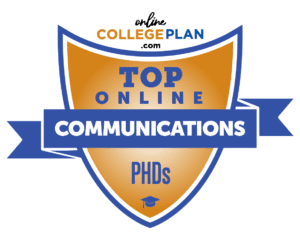
Communications is a very broad and interdisciplinary area of study. It focuses on the methods, tools, and platforms that people use to communicate and interact with one another. This is a type of degree with sweeping applications in the professional world. Mass media, social engagement, professional interaction, and more all fall under the communications umbrella. As a field, it is easiest to sum communications up as the study of the rules and social structures used to convey and obtain information.
There are multiple forms of communication such as verbal, written, and even bodily. This area of study also extends to public relations , social media, linguistics, psychology, sociology, politics, and more. This field is one that has a lot of depth to it and a broad range of career options. Due to its sweeping nature, it can be easy to write it off as a liberal arts degree that would be difficult to apply in the professional world but that is starkly incorrect. The Bureau of Labor Statistics reports that media and communications occupations will grow at a rate of 6% between 2016 and 2026. This puts the field in line with the national average rate for all careers.
Earning a PhD in Communications
Choosing to earn your PhD in Communications is a big step but it is one that can propel you to new heights in your career. High-level positions in any area of the field are going to show a strong preference for those who hold a PhD. That is because a PhD is the highest level of academic honor in the country and less than 1% of the population will ever obtain one. Nothing shows that you are more prepared than a terminal degree. A PhD in Communications can also equip you with the skills you need to teach a communications course at the university level.
In fact, a lot of people think that the only professional outcome for a PhD in Communications is a teaching position. However, there are a number of other careers you could pursue. You could choose to work in journalism, advertising, a corporate office, a government agency, and more. With a PhD in Communications, you are also likely to see a higher annual salary. The median salary for PhD graduates in their first year of employment is $80,000. The average salary in all of America comes in much lower at $56,516 per year.
While earning a PhD in Communications, you will be given a strong foundation in many different areas, particularly those relating to Media, Psychology, Marketing, and Communications. Some of the courses you will likely take include:
- Communication in a Global Environment
- Media, Culture and Community
- New Media and Technology
- Information, Political Economy and Entertainment
- Groups, Organizations and Networks
Of course, there are many other topics that are covered and many of them depend on the area you choose to focus on when earning your PhD. Some concentration examples include Marketing Communications, Corporate Communication, or Media Industries and Institutions.

Online PhD in Communications Programs
There are very few programs offered when you’re searching for an online PhD in Communications. In fact, we only found one program that met our ranking criteria. However, this is likely to expand as the field continues to grow. Universities do what they can to adapt to the needs of their evolving student bodies.
With that said, you can still earn this degree online . Even though there are only a few relevant options at this time, a distance-based degree may be better for you. Especially for those of you who are at the stage in your career that you’re ready to pursue a PhD.
Online programs tend to be more flexible. You will most likely be able to work full-time while you study and many online programs will integrate the job that you already do into the curriculum, allowing you to fulfill certain requirements just from doing your job! Online programs don’t require you to relocate and typically have fewer costs associated with them. On top of that, many institutions (the majority of them, in fact) allow online students to receive scholarships, grants, financial aid , and even stipends.
Taking the time to sift through your options and choose the best school for you is often the most difficult part of going to college online . For that reason, we’ve done the research for you and compiled a ranking of the best online doctorates in the field of communications. All schools were ranked according to the following.
Methodology
In order to create this ranking, we started by gathering a list of school that offered PhD programs in communications at a distance. Due to the lack of such programs that met our initial ranking criteria, we also chose to include relevant doctoral programs in communications that were available online. In order to be considered, in addition to offering a doctorate level program in communications in a distance-based format, schools had to be based in the United States, hold proper accreditation, and could not operate as for-profit institutions.
Once we gathered our list of schools, we ranked them based on the following three factors:
- Freshman Retention Rate (⅓ of final score)
- Graduation Rate (⅓ of final score)
- Affordability (⅓ of final score)
Each school could have earned a total possible score of 300 points. They were ranked according to their scores and presented in ascending order below. All of the information used was gathered from the schools’ websites whenever possible. In the even that we needed some additional information, we also utilized the databases of the National Center for Education Statistics, U.S. News & World Report , Niche.com, and Collegedata.com.
It is important to note that no school is ever given preferential treatment by OnlineCollegePlan for any reason. Some schools that would have otherwise ranked are omitted here due to insufficient data or per their own request. We’d also like to note that cost information and affordability are based on the residential cost of attendance and are simply estimates. We do not guarantee the tuition rate of any school or program.
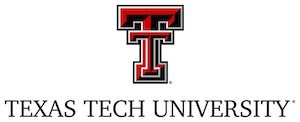
Doctor of Philosophy in Technical Communication & Rhetoric
Texas Tech University offers a great option for those of you who would like to earn a PhD in Communications, and that is the PhD in Technical Communication & Rhetoric. This program is designed to help strengthen your skills in five very broad areas. These include Rhetoric, Composition, and Technology; Technical Communication; Rhetorics of Science and Healthcare; Technology, Culture, and Rhetoric and; Visual Rhetoric, New Media, and User-Centered Design.
This is a 60-credit program that you must have a master’s degree to be eligible to enroll in. In addition to the core requirements, 15 of your credits can come from a minor that you choose. You can add a field you’d like to work in so you can better understand the relationship between technical communication and the field you’d like to work in. This degree is typically geared towards those who would like to teach at the university level; however, this is the highest level of education you can receive in any area, so you don’t need to feel limited.
There is a two-week workshop in May of every year that you will be required to attend, but the rest of the program is completely online. The courses are delivered through a mix of asynchronous and synchronous components. In a typical course, you will meet once or twice weekly in a live session with your cohort and your professors; the number of weekly meetings depends on the semester.
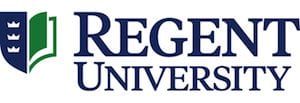
PhD in Communications
Regent University offers an online PhD in COmmunications that requires just one visit to campus. This one visit is a week-long summer residency on campus in Virginia Beach, Virginia. The entire program consists of a minimum of 56 credit hours, but some students may complete as many as 64. There are eight session start dates throughout the year, and thus, eight sessions. This helps you get done faster because there are fewer breaks.
You will take a variety of courses that will prepare you for a range of careers. You could get a higher level position in media relations, market analysis, research, or even teaching at the university level. You will be able to conduct effective research, have a deep understanding of communications theory, and have strong academic writing skills when you complete the program.
Some of the courses you’ll encounter as part of this program include Theology & Communication; Communication in a Global Environment; Academic Writing for Publication; and more. You will also virtually attend doctoral seminars, take basic research courses that are put in context for communication, and you will be required to complete a dissertation.

What is Communications?
Communications is any form of media that is used to convey one’s idea or message to another person or a group of people. People that aim to get a degree in Communications do so in order to learn how to inform and influence with the most efficacy by choosing the most appropriate delivery method of the information that needs to be provided. This could be via the web, print, audio, video, or still images, among others.

While studying to get a degree in the field of Communications, students will be provided with a solid foundation in the core areas of Communications on which they can choose build up towards a specialization that will enable them to focus their education path for a specific career. Students that are studying in Communications often choose to take courses in areas pertaining to Anthropology, Linguistics, Sociology, Cultural Studies or Health Care Communications, among others. These specialization courses would be taken concurrently with the core credit courses, such as Economics, Marketing, Management Theory, Media and Mixed Media Studies, Organizational Communication, and Ethics. Even if a student decides to not pursue a more focused education in the field of Communications, they will still obtain a strong understanding of the core values that many employers are looking for when they are looking for new hires to do a multitude of different professional tasks.
If you think you may have an interest in pursuing a career in Communications or any Communications-related field, we recommend you research your options when it comes to finding a school that will best suit your needs and goals. There are many great schools out there that provide many different degree options in Communications, and choosing the right school to provide you with a comprehensive and affordable education that fits into your schedule is the single most important thing that you can do to ensure your path towards a career in Communications gets off to the best possible start.
How Long Does it Take to Get a Communications Degree?
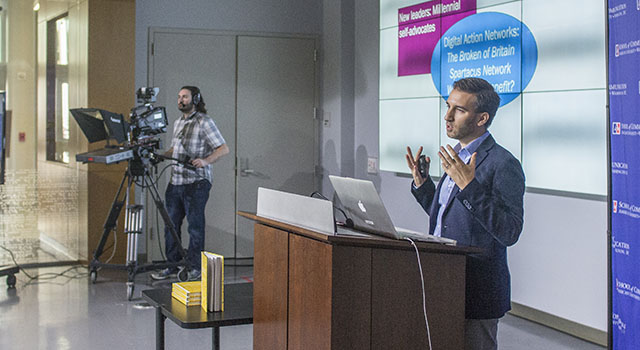
There are, of course, ways to speed up many degree options. These degree paths are generally what is known as an “Accelerated” degree path. An Accelerated degree path can really help a student to obtain their desired degree in a shortened amount of time, which will benefit them greatly later, as they will be able to establish themselves in their field of choice more quickly. An Accelerated degree is often a great option for students that are able to attend full-time and dedicate more of their time to their education. Accelerated degrees often utilized online programs to supplement the normal in-person classes that are needed to fulfill the required credits for degree completion.
Many well-known and prestigious schools around the country offer Associate’s degrees, Bachelor’s degrees and PhD degree programs in the field of Communications that can be completed in a fully asynchronous and online manner or in a blended education offering, meaning that most of the mandatory courses can be completed online or in a more traditional on-campus format. A lot of these schools even offer Accelerated degree options to their full-time students, both online and on-campus.
What Can You Do With a PhD in Communications?

Some of the fields that rely heavily on the expertise of professionals that have a strong background in the field of Communications include:
- Broadcasting;
- News Agencies;
- Advertising Agencies;
- Courts of Law, and;
- Marketing Research Firms.
What Jobs Can You Get With a Communications Degree?

- Public Relations and Fundraising Manager;
- Technical Writer;
- Journalist, and;
- Marketing Manager, among many others.
This is just a small sample of jobs that you would be qualified for with a PhD in Communications. There are many other career paths that would be open to you as a Communications major. These career paths would have you doing specific tasks relating to the field of Communications, but the field that you could be performing your Communications work could be anything. Virtually every company, association, and organization have varying degrees of need for an employee with a degree in Communications. Due to the background that individuals with a PhD in Communications will possess in numerous highly desired areas-of-expertise, many associations and organizations will have a strong desire to have a Communications professional on their payroll. If you are thinking about enrolling into a PhD in Communications program, or you wish to pursue a career in Communications at all but are worried about your future career prospects, you can rest assured that you will be able to find a rewarding job with any number of industry leaders in the United States–or around the world–due to how in demand and how pivotal Communications is in running a successful business. For most companies, the skills and knowledge that is provided by completing a PhD program in Communications is the crux of their day-to-day functions.
What is the Average Communications Degree Salary?

- A Technical Writer will earn on average $71,850 per year;
- An Author will earn on average $62,170 per year;
- An Editor will earn on average $59,480 per year;
- A Public Relations and Fundraising Managers will earn on average $114,800 per year, and;
- A Broadcast and Sound Engineering Technicians will earn, on average $43,660 per year.
What Associations or Organizations Can You Join With Careers in Communications?

- Public Relations Society of America (PRSA): PRSA is a not-for-profit trade association that founded in 1947 by the merger of the American Council on Public Relations with the National Association of Public Relations Councils. PRSA is a long-time member of the Universal Accreditation Board (UAB) and provides its members with a suite of tools that will help them to hone their skills and to further their education.
- American Advertising Federation (AAF): The American Advertising Federation’s members are comprised of almost 100 prestigious corporate members that specialize in the fields of advertising and media. AAF’s network also represents nearly 40,000 advertising professionals individually.
- International Communication Association (ICA): ICA is a large academic association that helps to bring together scholars with an interest in the study, teaching and the various applications of all aspects regarding personal and mediated communication.
- International Association of Business Communicators (IABC): The International Association of Business Communicators, which is more commonly called the IABC, is a global network of Communications professional and which hosts a yearly three-day event–the World Conference–in which professional development seminars and activities take place alongside symposiums hosted by industry leaders and researchers.
- Society for Technical Communication (STC): The STC is an association that was formed in order to advance the professional understanding and application of Technical Communications. STC publishes a magazine eight times a year, which provides new insights into Technical Communications. Additionally, the Society for Technical Communications hosts an annual international conference known as the STC Technical Communication Summit, where professionals gather to discuss and exchange ideas relating to the field. STC also provides its members with live webinars, online certificate courses, and virtual conferences with Communications experts, among others.
These are just a few of the many different associations and organizations that will be open to you after you have obtained a PhD in Communications. Many of these organizations have a multitude of helpful tools for networking, researching, educating, and sharing ideas. By becoming a member of one or more of these organizations, you will be able to broaden your horizons and open up new opportunities in your Communications career. Additionally, by becoming a member of a Communications oriented organization or association, you will be able to socialize with your peers and those that hold the same career and academic interests as yourself, which should never be underestimated as a benefit.
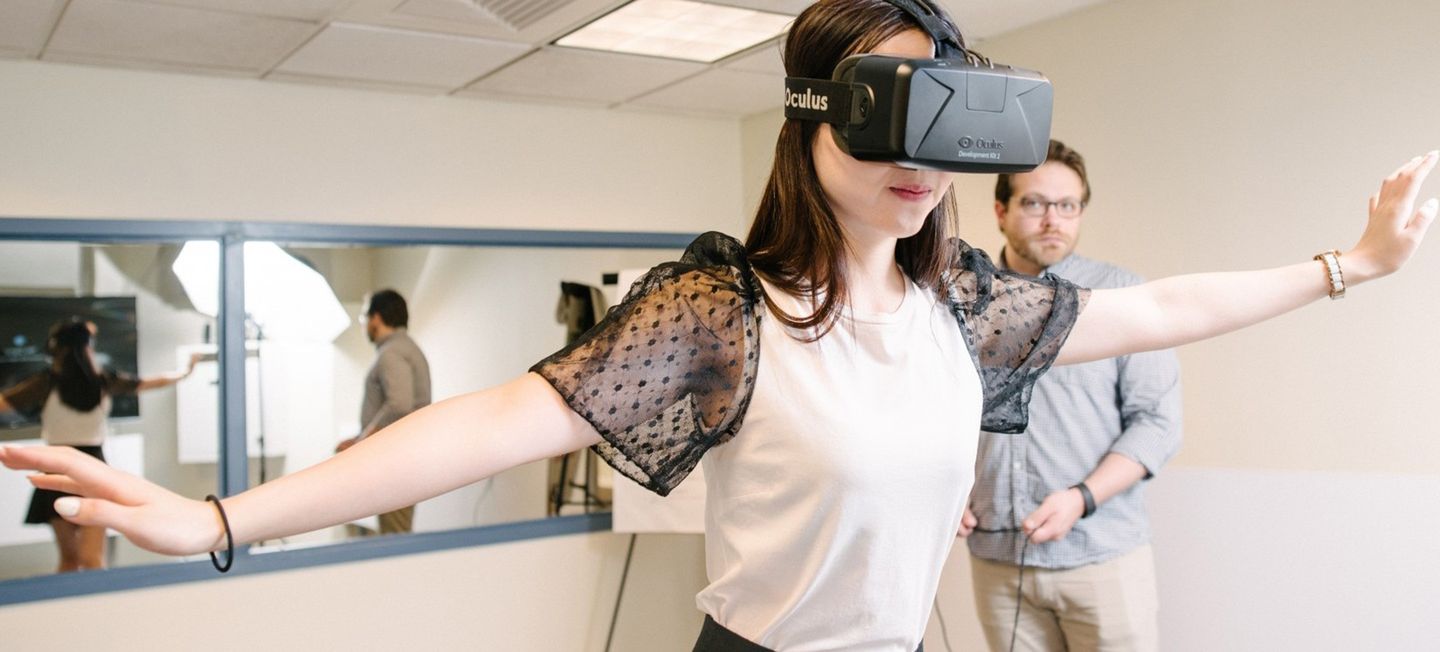
PhD in Emerging Media Studies
New media poses challenges for society and complexities for researchers. Are you ready to tackle both?
Academic Bulletin
- 01/15/2025 Priority deadline
- Degree Requirements
- PhD Students
- Request Info
The Boston University PhD program in Emerging Media Studies is the nation’s first doctorate program in emerging media and its critical, daily role in modern life.
COM’s unique program prepares its doctoral students to become sophisticated researchers and critical thinkers who are ready to advance the fields of communication, sociological, and media leadership. Designed for students with a master’s degree, this program helps candidates gain a comprehensive understanding of the role of emerging media in society and organizations and hone their research skills through independent, innovative, and mentored research.
Recent and upcoming dissertation topics address a wide array of topics, such as social perceptions of robots, the effects of television binge-watching, and media framing of direct-to-consumer genetic testing.
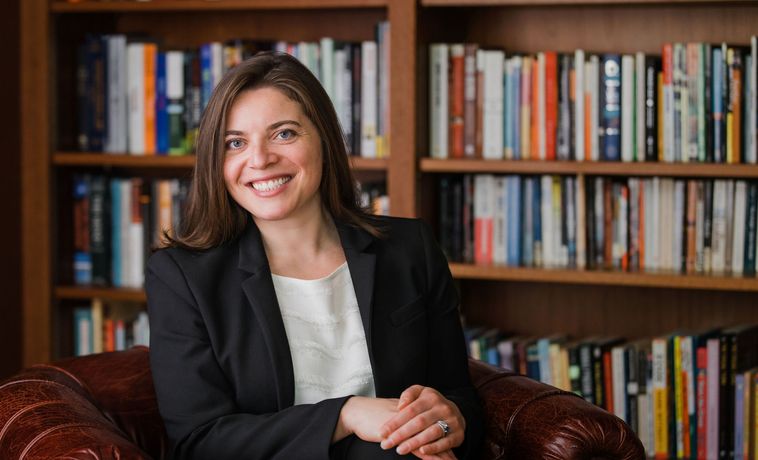
Meet COM’s First Doctoral Recipient, Sarah Krongard
It seems there’s always something to celebrate at COM, and the 2019 fall semester marked one particularly noteworthy achievement — PhD…
Learning and Teaching
EMS graduate students are taught and mentored by some of the leading researchers and thinkers in the field. The faculty make full use of the most advanced theories and methods to examine communication phenomena — from social media, streaming content, and AR/VR to Big Data and AI. Under their guidance, students learn how to conduct and analyze social science research concerning all types of emerging media.
As a doctoral student, you’ll serve as a teaching fellow while enrolled in the program. On average, you should expect to serve as a teaching fellow a minimum of two times during the program.
Resources for Research
COM graduate students get ready for careers by rolling up their sleeves for hands-on research.
All Emerging Media Studies students contribute to COM’s annual #ScreentimeBU conference, an opportunity to present their research in the field of digital communication and society as well as exchange their views with peers and field leaders concerning important contemporary issues. By showcasing the fruits of your research, you’ll share their ideas with the general public and industry leaders. Additionally, the conference provides an opportunity for you to develop your public communication capabilities and receive input from industry experts in a professional setting.
CENTER FOR MOBILE Communication Studies
Laptops, smart phones, and tablets have been transformed from novelties to necessities. But we’re only beginning to understand how they have transformed us.
EMS students also take advantage of research opportunities at COM’s Communication Research Center , COM’s primary research hub, and the state of-the-art technology offered at the Zimmerman Family Social Activation Center, that puts in-depth social media analytics at your fingertips.
Funding Support
Because the doctoral program is immersive and requires full-time participation for a number of years, all PhD students in Emerging Media Studies are funded for the duration of their study, up to a maximum of five years. Funding includes a full tuition scholarship, health insurance credit, and stipend in return for teaching and research obligations. Students with their own funding for the program (through the Fulbright Commission, government funding or other source) will still be required to serve as a teaching fellow for at least one semester. Compensation will be provided.
Benefit from Boston
One of BU’s greatest resources is its location. Consistently ranked among the most livable cities in the world, Boston is “America’s college town,” a city rich in history while remaining on the forefront of culture and innovation. Boston is a Top 10 U.S. media market, and home to some of the world’s best creative agencies, media companies and leading employers — offering boundless opportunities for internships and careers.
More than 80%
of our graduate students receive scholarships.
Purpose Driven
COM stands out from our peers. Our faculty offers a mix of researchers and practitioners who endorse a cross-discipline, hands-on approach to learning. Our location lies at the heart of an electric, media-savvy city.
But it may be COM’s shared values that matter most. We believe that communication requires diversity, critical thinking, and creative expression. We believe that communication must be grounded in truth, authenticity, effectiveness, and purpose. We believe that communication builds understanding among people and across society.
Emerging Media Research
Agenda setting in the wizarding world: computationally examining attribute agenda and….
Abstract: This study investigates the complex dynamics of public discourse on Twitter/X concerning the transgender-related controversy surrounding the video game…
Physiological response to political advertisement: Examining the influence of partisan and…
This study investigates voters’ physiological response to real political advertisements that are issue focused and sponsored by three different political…
Does world system theory rein in social media? Identifying factors contributing…
This article examined how social media content has shaped the representation of countries for publics around the world. Based on…
The Robot Rights and Responsibilities Scale: Development and Validation of a…
The discussion and debates surrounding the robot rights topic demonstrate vast differences in the possible philosophical, ethical, and legal approaches…

Meet the Emerging Media Faculty

Ayse Lokmanoglu
Assistant professor, emerging media studies.

Chris Chao Su
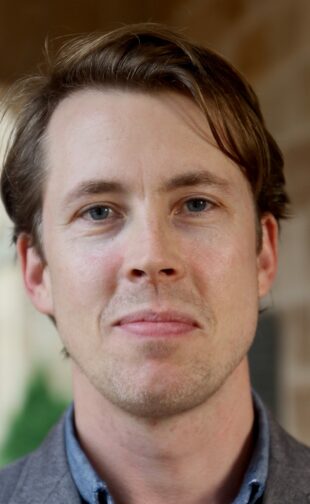
Chris Wells
Associate dean of faculty development; associate professor, emerging media studies.

Feld Professor of Emerging Media Studies
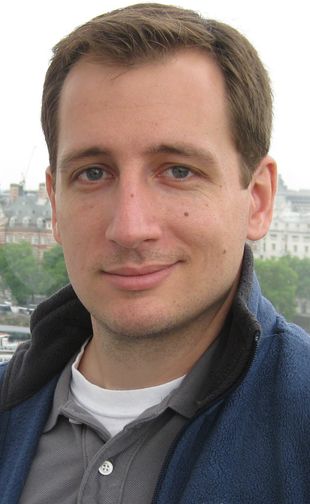
James Cummings
Associate professor, emerging media studies.
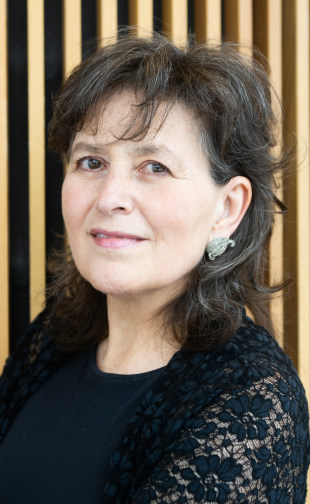
Maria Elizabeth (Betsi) Grabe
Dalton family professor, emerging media news, com’s new dalton professor knows disinformation from personal experience.
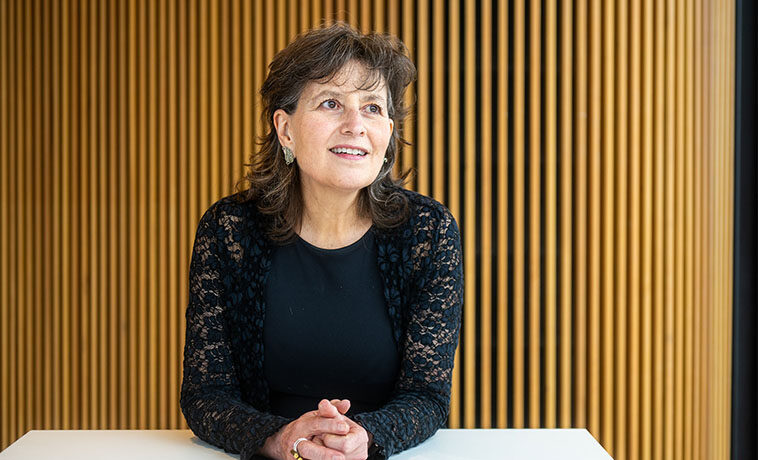
When Robots Deliver the News

Joan Donovan, Nationally Recognized Expert in Misinformation and Disinformation, Joins COM Faculty
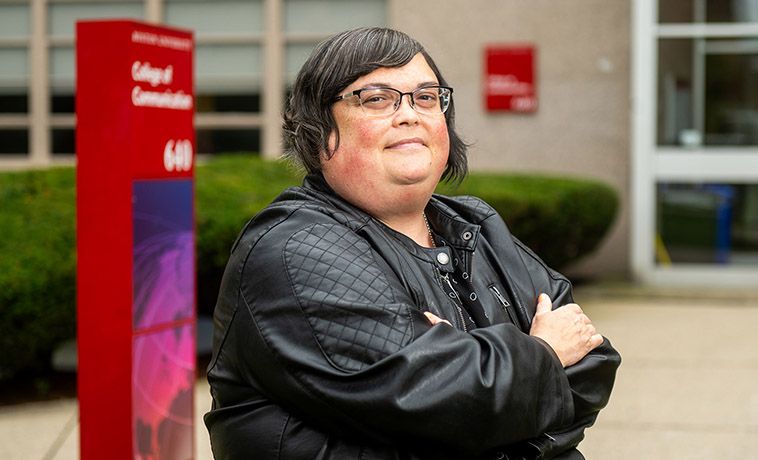
Emerging Media Studies

PhD Media Studies
The doctoral program in Radio-Television-Film emphasizes critical and contextual approaches to the study of media objects, industries, and cultures. With globally recognized faculty specializing in a wide array of media studies subfields, you will study and research in your chosen field and be prepared to enter into a rapidly evolving media landscape. You will be trained in an interdisciplinary array of media studies methods centered in pedagogical and professional development.

Expert Faculty Mentors

Affordable Tuition and Fees

Graduate Student Support
Program of study.
The PhD with concentration in Media Studies is a scholarly degree incorporating coursework, comprehensive exams, and research culminating in a dissertation. Students are expected to present their work at conferences and produce original work that is worthy of publication. Students admitted to this program must have already earned an M.A. degree.
Learn more about the Program of Work .
Teaching and Research Areas
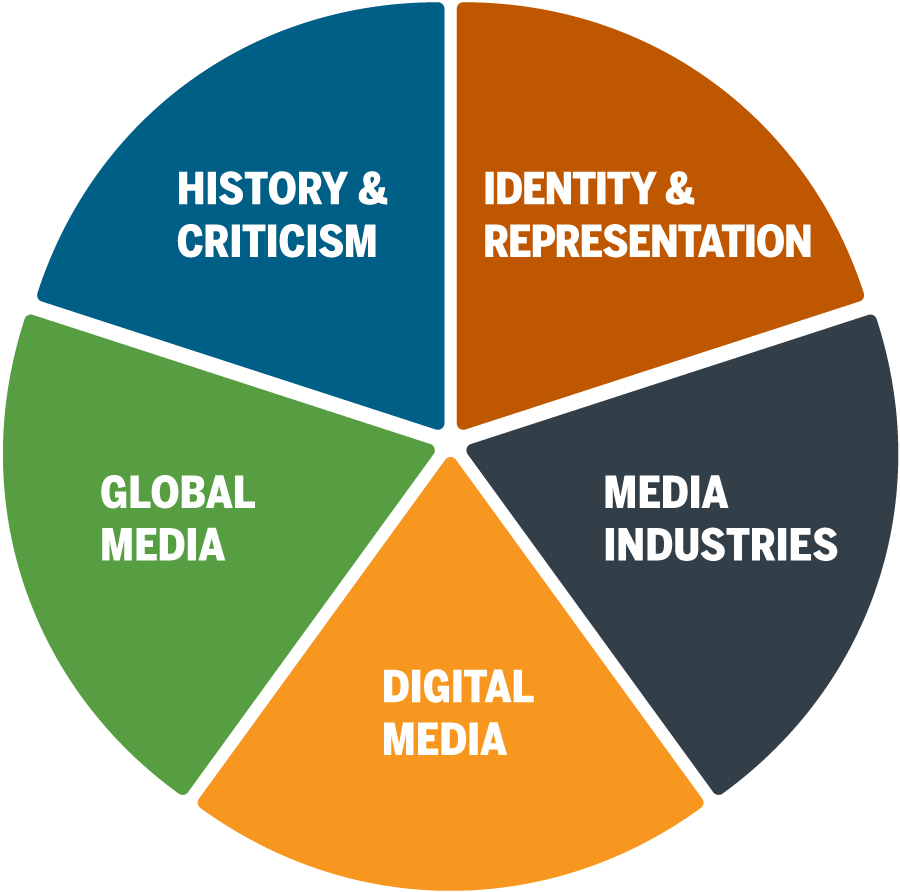
Digital Media
Analyze interactive and emergent media texts and platforms, participatory digital cultures, social media, and algorithmic culture.
Global Media
Study media texts, audiences, industries, and cultures from transnational, national, regional and diasporic perspectives.
History and Criticism
Examine the sociohistorical contexts of film and media and engage in aesthetic and critical analysis.
Identity and Representation
Explore media's impact on culture and identity through interdisciplinary courses that examine the politics of representation through gender, race, sexuality, citizenship, and more.
Media Industries
Engage in topics relating to creative labor, production, distribution, infrastructures, regulation, and exhibition.
Supporting Your Success
- Structured timeline for successful program completion
- Faculty mentorship
- Annual Review with detailed, constructive feedback
- High rate of success in job placement in the academy
- Pedagogy seminars and workshops
- Opportunities to teach stand-alone courses
- Internships with local media industry, festivals, policy institutions and cultural organizations
- Biannual professional development workshops
- Harry Ransom Center Film Research Collections
- Vast RTF resources at UT Libraries
- Editorial and organization roles for department-based journals
- Interdisciplinary and portfolio program options (in areas such as African and African Diaspora Studies, Women's and Gender Studies, and more)
Admissions Information
Meet our students, meet our faculty, see faculty and student scholarship, program contacts.
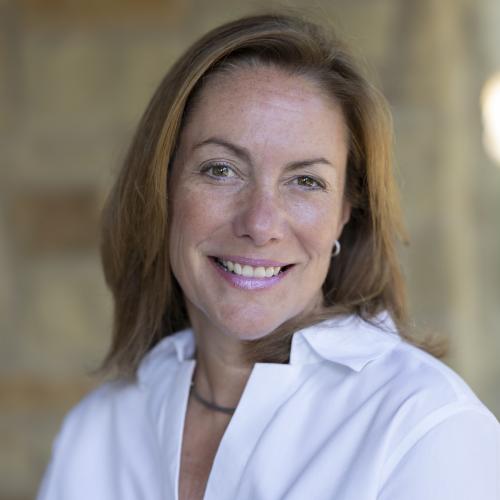
Area Head Media Studies
Caroline Frick
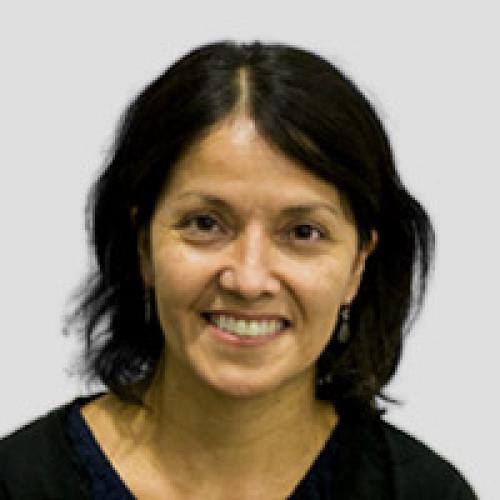
Graduate Advisor
Mary Beltrán
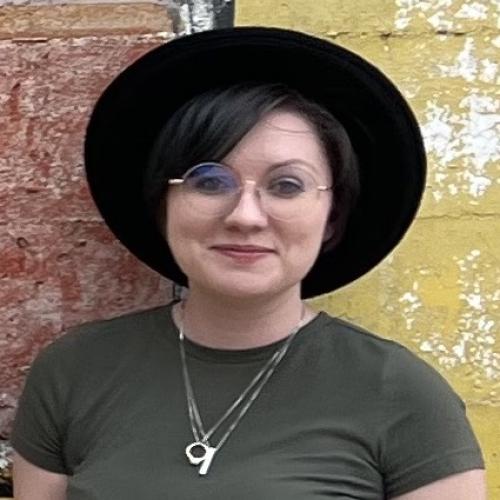
Graduate Coordinator
Teresa Warner
Sign Up for More Information Now!
Learn about info sessions, deadlines and more!
Online PhD in Communication Master the Art of Human Connection

Credit Hours
View Courses
100% online, 8-week courses
Transfer in up to 50% of the degree total
Expand Your Career Opportunities with Liberty’s Online PhD in Communication Studies
Communications is a vast field that, at its core, focuses on how humans connect with one another, both verbally and nonverbally. The communications industry is constantly growing and changing as new technologies emerge, so employers need people who are up-to-date on the latest communication theories, methods, and strategies.
If you want to enrich your understanding of human interaction and mass communication, then conferring a Doctor of Philosophy (PhD) in Communication is a good next step in your academic and professional journey. Liberty’s doctoral program focuses primarily on research and theory, allowing you to strengthen and enhance your knowledge of communications.
With a degree as diverse and in-depth as communications, you can gain the skills you need to be a leader in a variety of fields and businesses. Maybe you want to advance in your current career or start your own company. Or perhaps you would like to become a researcher or college professor. Whatever your career goals are, our PhD in Communication can help you make your dreams a reality.
This online program can help deepen your passion for learning and communication. We are excited to partner with you as you continue your research and study in the field of communications.

Backed by a brick-and-mortar campus ranked among Niche.com's Top 5 College Campuses in America
- What Sets Us Apart?
- Private Nonprofit University
- 600+ Online Degrees
- No Standardized Testing for Admission
- Transfer in up to 75% of an Undergrad Degree
- Transfer in up to 50% of a Grad/Doctoral Degree
Why Choose Liberty’s PhD in Communication Online?
Earning a PhD in Communication is a great way to advance in your current career or to enter a new field altogether. No matter what your goals are, our PhD in Communication can help provide you with a well-respected credential and research skills that are applicable to a host of professional settings, both in the public and private sector. For instance, you could teach undergraduate or graduate courses at a collegiate institution, carry out independent research, or work for a variety of businesses, agencies, and nonprofits.
As a doctoral student, you will study under professors who are experts in communication. Drawing on years of real-world experience, they can impart knowledge about the leading theories and praxis of communication – further preparing you to become an expert in the field.
At Liberty, you can become better equipped to achieve your academic and career goals — you’ll also be fostered in biblical principles and trained to be a Champion for Christ . Our professors can help you explore how to integrate these principles into the workplace and challenge you to follow God’s calling on your life.
We believe that you can earn your degree without putting your life on hold. That’s why we’ve designed our doctoral program to be completely online, meaning you won’t have to worry about attending on-campus classes. That way, you can complete your education while still focusing on your family and your job.
You already have a high level of mastery in the field of communications. But if you are looking for a terminal degree or a degree that allows you to mix theory and innovation, then our PhD in Communication is the program for you.
What Will You Study in Our Communications PhD Online Degree Program?
Our PhD in Communication can give you insight into the foundational principles that are behind successful communication campaigns. This program teaches invaluable knowledge and skills that can be applied to a variety of real-world roles, whether you want to work for a business, a nonprofit organization, or an institution of higher education.
With Liberty’s doctoral program, you will explore the “how” and “why” behind everyday practices used in the communications field. As well as studying various communication theories, you’ll complete practical, hands-on projects that can give you real-world practice with different communication strategies and scenarios, such as crisis communications. In addition, you can learn how to conduct in-depth research, how to assess data properly, and how to tell your company’s story more effectively than ever before.
With this degree, you will complete several courses centered around research and writing. You can sharpen your understanding of various industry techniques, such as insight tools and data gathering, to translate research and theory into effective field practice. Furthermore, our program can help develop your critical thinking and problem-solving skills through the use of solution-oriented literature.
Our professors will give you an in-depth look at how to effectively lead a communications team, how to use techniques for social media and video storytelling, and how to keep up with the ever-changing world of digital media. This program covers a diverse array of topics in the areas of both research and professional application, allowing you to gain a broad, in-depth skill set that can be applied to many jobs.
For instance, you’ll complete courses on qualitative research methods, donor relations, audience analysis, and contemporary issues in content communication. Since the field of communications covers a host of industries, your classes will draw on many disciplines, including business, education, and digital media studies. At the end of your online doctoral degree in communications, you will write and present a dissertation based on your own original research.
Potential Career Opportunities
- Advertising/public relations executive
- Chief customer experience officer
- Communications executive
- Director of online sales and services
- Research manager
- Social media executive
- University administrator
- University professor
- Vice president of customer satisfaction
Featured Courses
- DIGI 720 – Qualitative Data Analysis
- DIGI 825 – Seminar: From Digital Analytics to Communication Action
- DIGI 835 – Current Topics in Content Communication
- DIGI 845 – Communicating Research Data
Degree Information
- This program falls under our School of Communication and the Arts .
- View the Graduate Communication and the Arts Course Guides (login required) .
Degree Completion Plan

Not sure what to choose?
Speak to one of our admissions specialists to help you choose the program that best fits your needs.
- Tuition & Aid
Your success is our success, which is why we are committed to providing quality academics at an affordable tuition rate. While other colleges are increasing their tuition, we have frozen tuition rates for the majority of our undergraduate, graduate, and doctoral programs for the past 9 years – and counting.
Eligible current and former military service members and their spouses may qualify for a special rate of $300/credit hour ( learn more ) .
Tuition rates may change annually. For the most current information, please visit our LU Tuition Cost page.
All Tuition & Fees
Financial Aid & Scholarships
Financial Aid Forms & Eligibility
Scholarship Opportunities
Admission Information for Our PhD in Communication
Admission requirements.
- A non-refundable, non-transferable $50 application fee will be posted on the current application upon enrollment (waived for qualifying service members, veterans, and military spouses – documentation verifying military status is required) .
- Send official college transcripts (mailed as sealed, unopened copies or sent via a direct electronic transcript system). A regionally or nationally accredited master’s degree with at least a 3.0 GPA is required for admission in good standing.
- Applicants whose native language is other than English must submit official scores for the Test of English as a Foreign Language (TOEFL) or an approved alternative assessment. For information on alternative assessments or TOEFL waivers, please call Admissions or view the official International Admissions policy .
Preliminary Acceptance
If you are sending in a preliminary transcript for acceptance, you must:
- Be in your final term and planning to start your doctoral degree after the last day of class for your master’s degree.
- Complete a Master’s Self-Certification Form confirming your completion date. You may download the form from the Forms and Downloads page or contact an admissions counselor to submit the form on your behalf.
- Submit an official transcript to confirm that you are in your final term. The preliminary transcript must show that you are within 6 credit hours of completion for a 30-48 credit hour master’s degree or within 9 credit hours of completion for a 49+ credit hour master’s degree.
- Send in an additional, final official transcript with a conferral date on it by the end of your first semester of enrollment in the new doctoral degree.
Transcript Policies
Official college transcript policy.
An acceptable official college transcript is one that has been issued directly from the institution and is in a sealed envelope. If you have one in your possession, it must meet the same requirements. If your previous institution offers electronic official transcript processing, they can send the document directly to [email protected] .
Admissions Office Contact Information
(800) 424-9596
(888) 301-3577
Email for Questions
Email for Documents
Liberty University Online Admissions Verification
1971 University Blvd.
Lynchburg, VA 24515

Ready to Apply?
Submit your application online or over the phone.
Apply by phone: (800) 424-9595
Liberty University is dedicated to providing world-class educational experiences to military students across the globe.
Who May Qualify?
- Active Duty
- Reserve/National Guard
- Veterans/Retirees
- Spouses of Service Members and Veterans/Retirees
Military Tuition Discount
We want to help you find the doctoral degree you want – at a price you’ve earned. As a thank-you for your military service, Liberty University offers eligible current and former service members like you or your spouse multiple pathways to earn a doctoral degree for only $300/credit hour . Find out how you can take advantage of this unique opportunity as you work toward your goal of reaching the pinnacle of your profession – for less.
Inner Navigation
- Why Choose Liberty?
- What Will You Study?
- Admission Information
Have questions?

Are you ready to change your future?
Apply FREE This Week*
Request Information
*Some restrictions may occur for this promotion to apply. This promotion also excludes active faculty and staff, military, non-degree-seeking, DGIA, Continuing Education, WSB, and certificate students.
Request Information About a Program
Request info about liberty university online, choose a program level.
Choose a program level
Bachelor’s
Master’s
Certificate
Select a Field of Study
Select a field of study
Select a Program
Select a program
Next: Contact Info
Legal first name.
Enter legal first name
Legal Last Name
Enter legal last name
Enter an email address
Enter a phone number
Full Address
Enter an address
Apt., P.O. Box, or can’t find your address? Enter it manually instead .
Select a Country
Street Address
Enter Street Address
Enter State
ZIP/Postal Code
Enter Zip Code
Back to automated address search
Start my application now for FREE

IMAGES
COMMENTS
Online PhD in Media Studies Programs. The term "media" covers many forms of visual communication, from film studies to television and new media, such as gaming and other online avenues. Those who pursue an online PhD in Media Studies have the opportunity to tailor their degree to focus on a specific concentration.
Pursue Your Personal And Professional Marketing And Education Goals With Liberty's 100% Online PhD In Strategic Media. September 10, 2024. Chat Live (800) 424-9595 ...
Explore the top online PhD in Communications programs for 2025. Discover exciting career opportunities in media, public relations, and academia. ... Indiana University of Pennsylvania offers a PhD in Media and Communication Studies. A total of 60 credits are needed to graduate, with 12 hours used for a dissertation. ...
Mass media, social engagement, professional interaction, and more all fall under the communications umbrella. As a field, it is easiest to sum communications up as the study of the rules and social structures used to convey and obtain information. ... Regent University offers an online PhD in COmmunications that requires just one visit to ...
A PhD in communication & media can lead to either an academic career or a leadership role in professional communications. Academic careers center on teaching and research. University professors produce original research advancing scholarship in communications and media studies. In addition, they develop undergraduate courses and train students ...
The Boston University PhD program in Emerging Media Studies is the nation's first doctorate program in emerging media and its critical, daily role in modern life. COM's unique program prepares its doctoral students to become sophisticated researchers and critical thinkers who are ready to advance the fields of communication, sociological ...
The PhD with concentration in Media Studies is a scholarly degree incorporating coursework, comprehensive exams, and research culminating in a dissertation. Students are expected to present their work at conferences and produce original work that is worthy of publication. Students admitted to this program must have already earned an M.A. degree.
Find the best online PhD programmes in the field of Journalism & Media from top universities worldwide. Check all 11 programmes. Explore; Decide; Apply; Explore. ... Strategic Media (Online) Ph.D. / Full-time, Part-time / Online. 8,408 EUR / year. 4 years. Liberty UniversityOnline. View Programme Information. Featured .
Benefits of Our Ph.D. in Media Studies Online As a leader in distance education since 1985, we understand what it takes to create a flexible and affordable education for busy people.
Expand Your Career Opportunities with Liberty's Online PhD in Communication Studies. ... and digital media studies. At the end of your online doctoral degree in communications, you will write ...